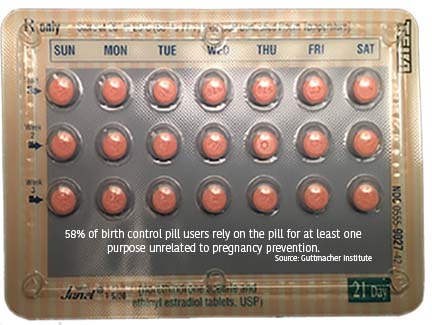Using ‘the pill’
Teens use oral contraceptives to regulate hormones and treat severe acne.
January 5, 2017
While asking for birth control pills can often be an awkward conversation between mother and daughter because of its association with sexual activity, BCPs can also be used to alleviate menstrual cramps, make menstruation more regular and help with facial acne.
Not all oral contraceptives are created equal, as each brand is made with different levels of estrogen and progestin and may not work the same for one person as it does for another, according to pediatrician Eileen Aicardi, MD.
“For some girls who get headaches, their headaches are worse on the pill, some are better,” Aicardi, who practices pediatrics, said. “For some girls who get terrible PMS, the PMS is worse, for some it’s better. There’s a whole bunch of different things that can happen that can alter which pill somebody is prescribed. There’s no one pill that’s exactly the right one for everybody.”
Birth control pills come in monophasic, biphasic and triphasic forms, with each pill utilizing one, two or three types of medicine for different purposes. Some forms of the pill stop menstruation completely.
“During my sophomore year I was dealing with really bad period cramps and they were so intense that I actually had to go to the hospital because I was in so much pain,” senior Ally Arora said. “My mom wanted me to try birth control because it can stop period flow or make the period less heavy, so that meant less cramps and pain for me.”
While some girls take the pill for menstrual irregularities and stop the menstrual cycle entirely, others take them to make their cycles more regular.
“I wasn’t getting my period because I have a deficiency in some natural hormones and so the doctors decided to put me on birth control because it would provide me with the same hormone that would allow me to have my period,” a CSH student who wished to remain anonymous, said.
Many brand name oral contraceptive pills are available in generic brand form. Generics may claim to be the same as their brand name counterparts, but they often do not undergo the same testing procedures, according to Aicardi.
“Girls may find that they were taking brand name and then maybe their insurance switched them to a generic one that’s supposed to be the same thing, but they’re having breakthrough bleeding,” Aicardi said. “The generic ones are not tested in the same way, looked at the same way. The big issue now is that a lot of insurance companies will not pay brand name.”
Women may experience side effects such as weight gain, breakthrough bleeding or nausea when they begin taking BCPs. If symptoms do not go away after a couple months, they should check in with their doctor to make sure the hormone dosage is right for them.
“I remember I started panicking a little bit after a couple of months because I felt off with my mood and I felt more upset, emotional and sensitive about things,” Arora said. “I questioned going off of it for a while, but it eventually wore out after a couple more months and I’m completely fine.”
Teens who ask their doctor to start taking birth control pills have their confidentiality protected under California law, according to Aicardi.
“Even if a mom were to call me and say ‘Did you give my daughter the pill?’ I have to say, ‘It’s not something I can discuss with you,’” Aicardi said. “For me, having been here for a long time and having longstanding relationships with parents, I feel really strongly that confidential is confidential.”
Taking birth control pills for menstrual reasons rather than for pregnancy prevention can lessen the awkwardness of a conversation with parents, according to the anonymous student.
“I don’t take birth control for the typical reason that a lot of people take it, which is it to prevent pregnancy,” the anonymous student said. “Because of that, I don’t think it was as uncomfortable as a talk for me because we knew it was for medical reasons. My parents were completely fine with that because they knew I needed it to start my period.”
Girls who feel they can’t talk to their parents can approach a doctor with questions regarding birth control. Often times, however, the conversation with parents is less nerve-racking than one would imagine, according to Arora.
“At first my mom was pretty nervous about going on it because she didn’t want it to stunt my health in any way, but I think she knew in the end it would benefit me in ways where I’m not in pain,” Arora said.










